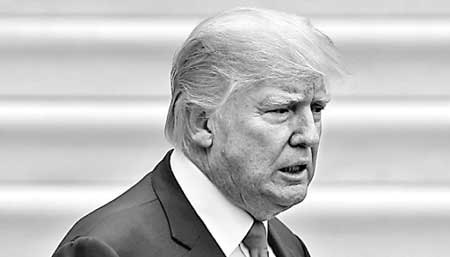Tuesday Feb 17, 2026
Tuesday Feb 17, 2026
Saturday, 19 August 2017 00:05 - - {{hitsCtrl.values.hits}}
 Washington (Reuters): President Donald Trump has stepped up his attacks on Republican senators, an approach he may regret if he is someday impeached and the Senate has to weigh charges against him stemming from an investigation into Russian meddling in the 2016 U.S. election.
Washington (Reuters): President Donald Trump has stepped up his attacks on Republican senators, an approach he may regret if he is someday impeached and the Senate has to weigh charges against him stemming from an investigation into Russian meddling in the 2016 U.S. election.
More than half of the 11 Republicans on the Senate Judiciary Committee, which would be central to any proceeding to remove Trump from office, have tangled with the Republican president, including on Thursday when he fired off early-morning tweets.
In one Twitter series, Trump called Senator Lindsey Graham “publicity seeking” and said he “just can’t forget his election trouncing” in the 2016 presidential race. Trump also assailed Senator Jeff Flake, another Republican critic, as “a non-factor in the Senate,” adding, “He’s toxic.”
Flake and Graham are members of the Judiciary Committee, whose Chairman Chuck Grassley has urged Trump to tone it down.
“He should be 100% sticking to ideas and forget about personalities,” Grassley said on Friday when pressed on whether Trump might find himself without the friends in Congress he would need to defend himself in an impeachment proceeding.
For his part, Grassley said his views would not be coloured by past presidential sniping.
“Let’s say the House of Representatives impeached the president of the United States. Then I’m a juror,” Grassley said. “The Senate is the jury that decides whether he should be impeached. The jury is supposed to be impartial.”
There is little serious talk being heard in Congress about removing Trump from office.
Two House Democrats have introduced an article of impeachment alleging obstruction of justice by the president in connection with an ongoing investigation of possible ties between his 2016 campaign and Moscow.
But Republicans control the House, as well as the Senate, and the article of impeachment has gained little traction.
Under the U.S. Constitution, the House of Representatives can vote to approve an impeachment measure. If that happens, it goes to the Senate, which acts as a jury and weighs the charges in the House measure. A two-thirds Senate vote is needed for conviction. Approval leads to removal from office.
Two presidents have been impeached by the House: Andrew Johnson in 1868 and Bill Clinton in 1998. Neither was convicted by the Senate. President Richard Nixon, facing almost certain impeachment over the Watergate scandal, resigned in 1974.
In the Clinton impeachment fight, the committee was a resource for the full Senate and could play a similar role in any future trial.
The White House did not immediately respond to a request for comment.
Having friends would help any president facing impeachment, said Charles Brain, a White House liaison to Congress during Clinton’s impeachment.
Without such friendships, Brain said, lawmakers “can just be quiet,” refusing to share information with the White House and letting attacks on the president gain momentum.
Besides Flake and Graham, Trump has had run-ins over various issues before and after his election with Republican Senator Ted Cruz, and other Judiciary Committee members, including Grassley, John Cornyn, Orrin Hatch, Thom Tillis and Ben Sasse.
The president has also at times attacked Republican senators not on the committee, including Mitch McConnell, John McCain, Marco Rubio, Rand Paul and Lisa Murkowski.
Special counsel Robert Mueller is investigating whether Trump’s campaign colluded with Russia to influence the election. Grassley’s committee also is looking into the matter, as are other congressional panels.
The Kremlin denies any election interference. Trump has dismissed the Mueller probe as a “witch hunt” and denies any collusion. In the end, Mueller could end up clearing Trump and his aides of any wrongdoing.
If not, at least two questions will loom large in a possible impeachment inquiry, said senior fellow Elaine Kamarck of the liberal-leaning Brookings Institution think tank.
One would be about the severity of any possible charges. Another, she said, would be “do you have friends, do you have people who believe in you and want to save your presidency?”